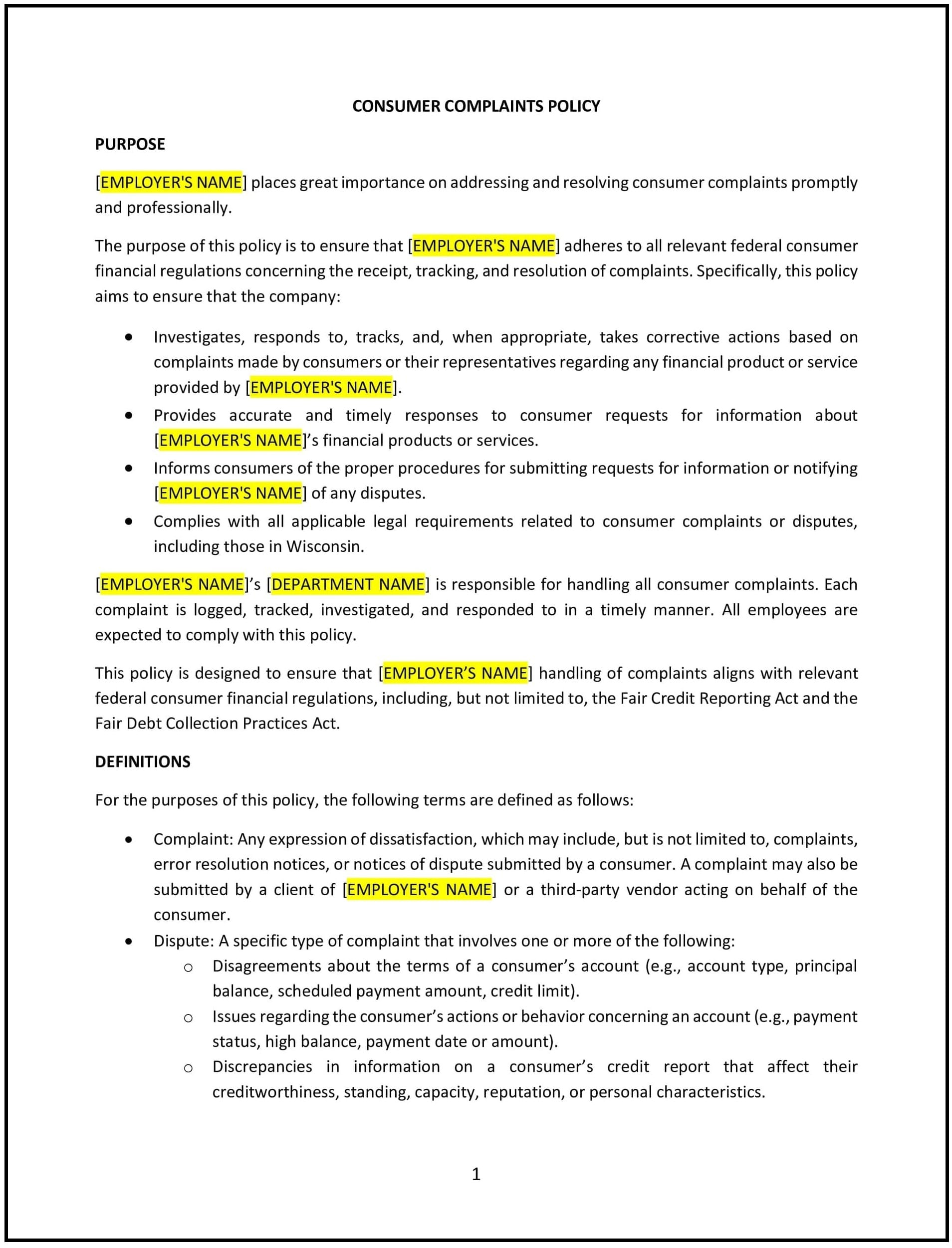Consumer complaints policy (Wisconsin): Free template
Got contracts to review? While you're here for policies, let Cobrief make contract review effortless—start your free review now.

Customize this template for free
Consumer complaints policy (Wisconsin)
A consumer complaints policy helps Wisconsin businesses establish clear procedures for handling customer complaints in a timely, consistent, and fair manner. This policy outlines how consumers can submit complaints, how these complaints will be reviewed, and the steps the business will take to resolve the issue, ensuring that customer concerns are addressed professionally and efficiently.
By implementing this policy, businesses can improve customer satisfaction, reduce the risk of legal disputes, and strengthen consumer trust and loyalty.
How to use this consumer complaints policy (Wisconsin)
- Define the types of complaints covered: Specify the types of complaints the policy addresses, such as issues related to product quality, customer service, billing, or delivery.
- Establish a clear reporting process: Outline how consumers can submit complaints, whether through online forms, email, phone calls, or in-person visits. Provide clear instructions on how to file a complaint, including any required documentation or details to submit.
- Set a timeline for response: Define how quickly the business will acknowledge receipt of a complaint and the maximum time frame for providing a resolution. Ensure that the response time is reasonable and aligns with consumer expectations.
- Create a process for investigating complaints: Detail how the business will review and investigate each complaint, including the steps taken to gather information, evaluate the situation, and identify the root cause of the issue.
- Establish a resolution process: Outline the steps for resolving complaints, including potential solutions such as product replacements, refunds, apologies, or compensation. Ensure that the resolution process is transparent and fair for all parties involved.
- Protect consumer privacy: Specify that consumer complaints and personal information will be handled confidentially and in accordance with applicable privacy laws.
- Train employees: Provide training to employees on how to handle consumer complaints professionally, focusing on empathy, active listening, and effective problem-solving.
- Encourage feedback: Encourage consumers to provide feedback on the complaints resolution process to help improve the business’s products, services, and customer interactions.
Benefits of using this consumer complaints policy (Wisconsin)
This policy offers several benefits for Wisconsin businesses:
- Improves customer satisfaction: By providing a clear and efficient process for handling complaints, businesses can address consumer concerns quickly and effectively, improving customer satisfaction and loyalty.
- Reduces legal risks: A well-defined complaints process helps resolve issues before they escalate to legal disputes, reducing the risk of lawsuits or regulatory penalties.
- Enhances business reputation: A business that handles complaints professionally and fairly is more likely to maintain a positive reputation and build trust with consumers.
- Identifies areas for improvement: A structured complaints process allows businesses to track recurring issues, identify trends, and make improvements to products, services, or operations based on consumer feedback.
- Promotes transparency: The policy helps ensure that consumer complaints are addressed in an open and transparent manner, fostering a sense of fairness and trust with customers.
Tips for using this consumer complaints policy (Wisconsin)
- Communicate the policy clearly: Ensure that all consumers are aware of the complaints process, including how to submit a complaint and what to expect during the resolution process.
- Provide multiple ways to submit complaints: Offer several methods for consumers to file complaints, including online forms, email, phone, and in-person options, to make the process accessible and convenient.
- Empower employees to resolve complaints: Train customer service representatives and other employees to handle complaints effectively, empowering them to resolve issues quickly and professionally.
- Track complaints and resolutions: Keep records of all consumer complaints, including the details of the complaint, the resolution, and any follow-up actions. This can help identify trends and improve business practices.
- Review the policy regularly: Review the complaints policy annually or whenever there are changes to consumer protection laws, business operations, or customer expectations to ensure it remains relevant and effective.